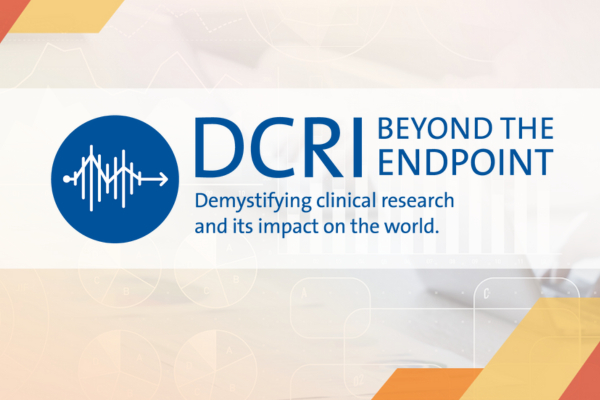DCRI Accomplishments – Fall 2025
DCRI Accomplishments showcases the publications, awards, and other achievements of our faculty members. Each quarter, a new collection will highlight the most recent accomplishments.
In a U.S. First, Drones Deliver AEDs in North Carolina County
A new Duke Health research project aims to reduce cardiac arrest response times by using drones to quickly deliver treatment devices. Duke Health and partners in Forsyth County have launched a first-of-its-kind study in the U.S. to dispatch drones carrying automated external defibrillators – known as AEDs – during real 911 calls.
DCRI reveals new results, shares expert insights at AHA25
The Duke Clinical Research Institute (DCRI) had a broad and visible presence throughout the 2025 American Heart Association Scientific Sessions, Nov. 7-10 in New Orleans. Faculty and staff participated in more than 40 sessions across a wide spectrum of scientific and educational sessions. Their contributions spanned general and featured presentations, moderated discussions, digital poster forums, late-breaking and featured science, and hands-on simulations.
Duke Awarded Funding to Raise Standard of Care for Pain Management
Chronic pain is one of the most burdensome conditions in the United States, with lower back pain comprising the largest subset of those conditions, and veterans bearing a disproportionate amount of this societal burden. Two Duke researchers will lead a new study to change that reality and raise the standard of pain care management with navigated care.
Expanding Clinical Research in Rural Communities
For most of rural America, access to clinical research addressing rural health — and to physician-researchers focused on this area — is extremely limited. According to Danny Benjamin, MD, PhD, MPH, that’s simply not sustainable for long-term health in most of the country. As a leader of a program designed to develop future researchers through hands-on experience and mentorship, Benjamin is working to address this shortage.
No Copay Physical Therapy Program Associated with Lower Downstream Imaging, Injection, and Surgery for Musculoskeletal Conditions
A program that removes copays for physical therapy is associated with lower rates of costly health care services like imaging, injection, and surgery, according to findings from a new study from ATI Physical Therapy and the Duke Clinical Research Institute (DCRI). The report, “Episode of Care Characteristics following Implementation of a No Co-pay Physical Therapy Program for Musculoskeletal Conditions” was published on October 24 in the Physical Therapy and Rehabilitation Journal and made available on ptfirst.com.
Remote Health Care Helps Heart Failure Patients Get the Right Medications Faster
For millions of Americans living with heart failure, getting the right medications at the right doses can be a slow and frustrating process, which can lead to delayed treatment adjustments, undertreatment and risks for worsening symptoms.
DCRI Podcast "Beyond the Endpoint" Returns for Season 2
The Duke Clinical Research Institute's (DCRI) podcast "Beyond the Endpoint" returns for its second season to address some of the most pressing health questions facing both listeners and the research community.
DCRI faculty share late-breaking study results, lead key discussions on heart health at European Society of Cardiology Congress
Faculty members and fellows of the Duke Clinical Research Institute (DCRI) shared their expertise during the European Society of Cardiology Congress (ESC) in Madrid, Spain, Aug. 29—Sept. 1.
DCRI Accomplishments – Summer 2025
DCRI Accomplishments showcases the publications, awards, and other achievements of our faculty members. Each quarter, a new collection will highlight the most recent accomplishments.









